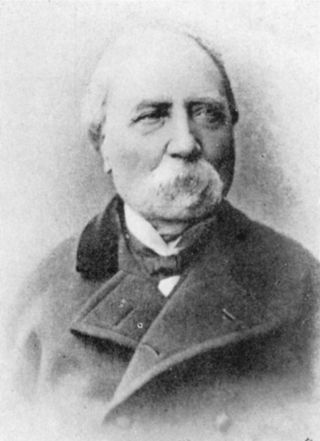
François Édouard Anatole Lucas was a French mathematician. Lucas is known for his study of the Fibonacci sequence. The related Lucas sequences and Lucas numbers are named after him.

Cabo San Lucas, or simply just Cabo, is a resort city at the southern tip of the Baja California Peninsula, in the Mexican state of Baja California Sur. As at the 2020 Census, the population of the city was 202,694 inhabitants. Cabo San Lucas together with the famous San José del Cabo are collectively known as Los Cabos. Together, they form a metropolitan area of 351,111 inhabitants.

Pierre-Hippolyte Lucas was a French entomologist.

Gordon David Plotkin, is a theoretical computer scientist in the School of Informatics at the University of Edinburgh. Plotkin is probably best known for his introduction of structural operational semantics (SOS) and his work on denotational semantics. In particular, his notes on A Structural Approach to Operational Semantics were very influential. He has contributed to many other areas of computer science.
Edward Lucas may refer to:

John Baptiste Charles Lucas was a French-born member of the U.S. House of Representatives from Pennsylvania. After meeting Benjamin Franklin, Lucas was so inspired—and so impatient with class injustices in France—that he sailed to America. Armed with a letter of introduction from Franklin, Lucas was made a federal land grant judge by Thomas Jefferson, then elected to the U.S. House of Representatives. He eventually resigned and moved to St. Louis, reportedly in part because he and his wife, Anne, missed French society.

Cymindis is a genus of ground beetle native to the Palearctic, the Near East, and North Africa. It contains the following species:
Cymindis elegans is a ground beetle species in the genus Cymindis, in the subfamily Lebiinae and tribe Lebiini. It is found in Virginia in the United States.
Cymindis andreae is a species of ground beetle in the subfamily Harpalinae. It was described by Édouard Ménétries in 1832.

Cymindis axillaris is a species of ground beetle in the subfamily Harpalinae. It was described by Johan Christian Fabricius in 1794.
Cymindis carnica is a species of ground beetle in the subfamily Harpalinae. It was described by J. Muller in 1924.
Cymindis championi is a species of ground beetle in the subfamily Harpalinae. It was described by Andrewes in 1928.

Cymindis cincta is a species of ground beetle in the subfamily Harpalinae. It was described by Brulle in 1839.
Cymindis cribricollis is a species of ground beetle in the subfamily Harpalinae. It was described by Pierre François Marie Auguste Dejean in 1831.
Cymindis favieri is a species of ground beetle in the subfamily Harpalinae. It was described by Fairmaire in 1859.
Cymindis klapperichi is a species of ground beetle in the subfamily Harpalinae. It was described by Jedlicka in 1956.
Cymindis lindbergi is a species of ground beetle in the subfamily Harpalinae. It was described by Mateu in 1956.
Cymindis miliaris is a species of ground beetle in the subfamily Harpalinae. It was described by Johan Christian Fabricius in 1801.
Cymindis seriata is a species of ground beetle in the subfamily Harpalinae. It was described by Hatch in 1953.
Cymindis vaporariorum is a species of ground beetle in the subfamily Harpalinae. It was described by Carl Linnaeus in 1758. Most adults are collected in June and July, but likely are around all summer.







